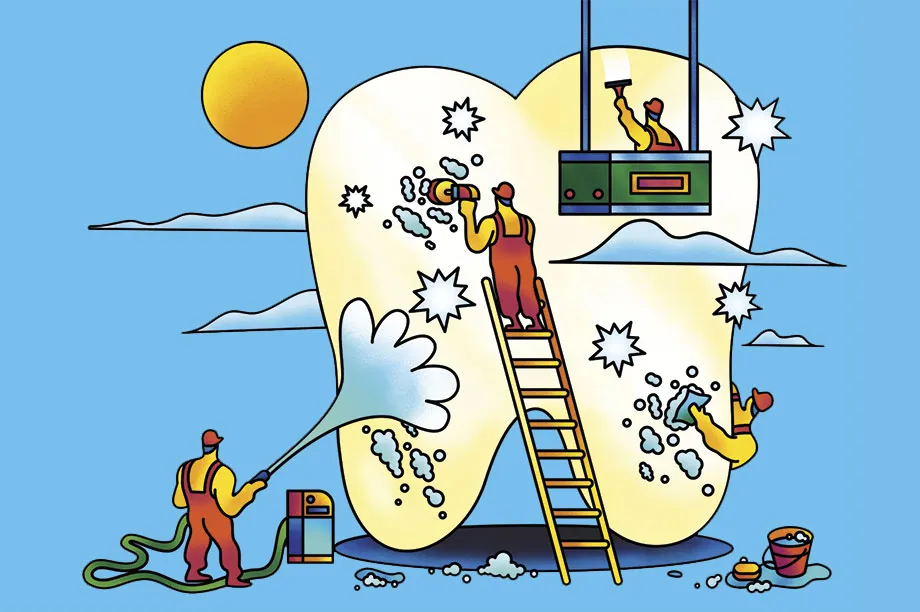Regular check-ups have been missed during the COVID crisis…
… So it’s time to think about booking an appointment, especially if you’re a heavy drinker, a smoker, or someone with problems who used to visit the dentist regularly. If you’re at all worried, talk to your dentist. Dental surgeries are COVID-secure and it’s important to catch serious problems early when treatments are more effective.
More people are grinding
Anxiety associated with the COVID lockdowns is causing more people to grind their teeth. If it’s happening during the day, you can try to stop yourself. If it’s happening at night, a mouthguard can help, as can a botox injection – talk to your dentist about it.
Brush twice a day
And clean between the teeth at least once a day with floss or interdental brushes. The most important brush is the one just before you go to bed, so only drink water after that. Also, always wait for an hour between consuming anything acidic – like fizzy drinks or citrus fruits – and brushing your teeth, or you’ll risk damaging the enamel.
Need to know...
- Switch from a manual toothbrush to an electric one. Manual brushes just don’t clean very well.
- Ask your dentist about recycling your toothbrushes and toothpaste tubes. Some surgeries will offer this service.
- Don’t brush your teeth straight after drinking your morning glass of fruit juice – you risk damaging the enamel.
Pay attention when you brush
Watch yourself in the mirror and be systematic. Make sure you brush every surface (outside, inside, biting surfaces) and go right to the gum edges as this is where the plaque does the most damage.
Electric is best
Bamboo brushes may be green, but manual brushes don’t clean that well. I recommend using an electric toothbrush with a timer and a pressure sensor so you know you’re brushing for the right amount of time and not pressing too hard.
Some companies make recyclable electric toothbrush heads, and some dental surgeries collect and recycle brushes, heads, tubes and packaging. You can find them online.

Make sure your toothpaste contains fluoride
Fluoride in toothpaste is totally safe and proven to help protect teeth from decay. There are lots of ‘alternative’ toothpastes on the market, but take care. Toothpastes that contain charcoal can be gritty and are potentially damaging because they’re abrasive.
It’s illegal for non-dentists to offer teeth-whitening treatments
If you want whiter teeth, either use a whitening toothpaste, which will remove surface staining and lighten them a little, or go for professional tooth whitening. A dentist will do all the proper checks and choose the formulation that’s right for you.
How white you like them is up to you, but there’s a limit to how far you can go without cutting your teeth down and covering them in porcelain. Just don’t go to a beautician, and be aware that although you can buy products online, the formulations will be weak and won’t do much.
Read more fromA Scientist’s Guide to Life:
- 33 simple ways to improve your life with science
- How to get fit at home (and the mistakes to avoid): A scientist’s guide
- A scientist’s guide to life: How to concentrate
- A scientist’s guide to life: How to sit correctly
- A scientist’s guide to life: How to stay warm
If you want to know whether your breath smells…
…Ask someone you trust. It’s sometimes difficult to know if your breath smells because you smell it all the time. Coffee and smoking don’t help, but good dental hygiene can. Brush regularly and stay hydrated.
Sensitivity is often caused by overbrushing
It can cause wear to the tooth surface and recession of the gums. Acids and abrasive toothpastes also don’t help. Toothpastes formulated for sensitive teeth can help, but they all have different chemical structures, so try a few and find what works for you.
- This article first appeared inissue 361ofBBC Science Focus Magazine–find out how to subscribe here